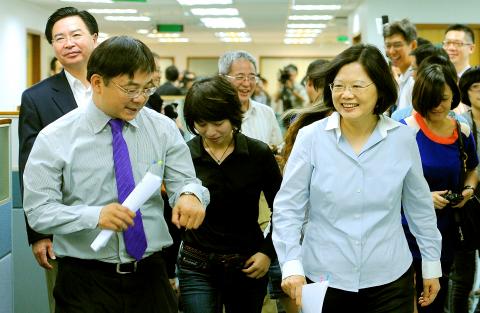It is imperative for the Democratic Progressive Party (DPP) to rebuild its relations with society and facilitate closer engagement with China’s civic movments, academics said yesterday.
The DPP has lost its touch in managing social issues and its relations with Taiwan’s civil society have soured, while at the same time it has never fully understood the emerging civil society in China, former DPP chairperson Tsai Ing-wen (蔡英文) said at the conclusion of a closed-door meeting on the issue, which she chaired.
Rebuilding a constructive partnership between the party and civil society and improving its understanding of social issues would help the DPP find “a new shared idea” between the party and its supporters, Tsai said.

Photo: Liu Hsin-de, Taipei Times
Almost everyone at the meeting agreed that the DPP has a long way to go in terms of its understanding of China.
Collaboration with civil societies across the Taiwan Strait could help change the structure of the bilateral relations altogether, Tsai said in summing up dozens of participants’ comments.
Chinese dissident Wang Dan (王丹), who now teaches in Taiwan, urged the DPP to build contacts with Chinese NGOs, reporters, intellectuals, liberal government officials, business leaders, human rights lawyers and students.
It would be also important for the DPP to distinguish between China and the Chinese Communist Party and the Chinese government as distinct from Chinese society, in its policies, Wang said.
Observing the recent civic movements in Taiwan that have organized large protests, Academia Sinica fellow Wu Jieh-min (吳介民) said there could be three scenarios for future civil movements — being absorbed by political parties, a parallel development and competition with political parties or replacing current political parties.

An apartment building in New Taipei City’s Sanchong District (三重) collapsed last night after a nearby construction project earlier in the day allegedly caused it to tilt. Shortly after work began at 9am on an ongoing excavation of a construction site on Liuzhang Street (六張街), two neighboring apartment buildings tilted and cracked, leading to exterior tiles peeling off, city officials said. The fire department then dispatched personnel to help evacuate 22 residents from nine households. After the incident, the city government first filled the building at No. 190, which appeared to be more badly affected, with water to stabilize the

Taiwan plans to cull as many as 120,000 invasive green iguanas this year to curb the species’ impact on local farmers, the Ministry of Agriculture said. Chiu Kuo-hao (邱國皓), a section chief in the ministry’s Forestry and Nature Conservation Agency, on Sunday said that green iguanas have been recorded across southern Taiwan and as far north as Taichung. Although there is no reliable data on the species’ total population in the country, it has been estimated to be about 200,000, he said. Chiu said about 70,000 iguanas were culled last year, including about 45,000 in Pingtung County, 12,000 in Tainan, 9,900 in

DEEPER REVIEW: After receiving 19 hospital reports of suspected food poisoning, the Taipei Department of Health applied for an epidemiological investigation A buffet restaurant in Taipei’s Xinyi District (信義) is to be fined NT$3 million (US$91,233) after it remained opened despite an order to suspend operations following reports that 32 people had been treated for suspected food poisoning, the Taipei Department of Health said yesterday. The health department said it on Tuesday received reports from hospitals of people who had suspected food poisoning symptoms, including nausea, vomiting, stomach pain and diarrhea, after they ate at an INPARADISE (饗饗) branch in Breeze Xinyi on Sunday and Monday. As more than six people who ate at the restaurant sought medical treatment, the department ordered the

Taiwan’s population last year shrank further and births continued to decline to a yearly low, the Ministry of the Interior announced today. The ministry published the 2024 population demographics statistics, highlighting record lows in births and bringing attention to Taiwan’s aging population. The nation’s population last year stood at 23,400,220, a decrease of 20,222 individuals compared to 2023. Last year, there were 134,856 births, representing a crude birth rate of 5.76 per 1,000 people, a slight decline from 2023’s 135,571 births and 5.81 crude birth rate. This decrease of 715 births resulted in a new record low per the ministry’s data. Since 2016, which saw